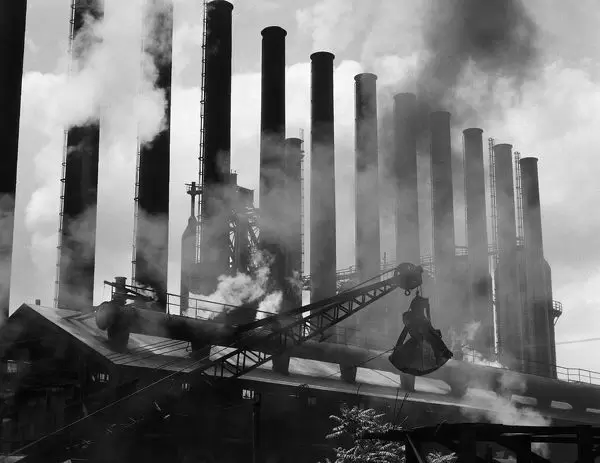Malm, Workerism and Ecological Leninism
In a series of two articles, Davide Gallo Lassere explores the history and present state of global warming, fossil fuels and Covid-19 in critical dialogue with Andreas Malm's eco-Marxism.

''The explosion [...] of emissions is the atmospheric legacy of the class struggle''
''Ecological autonomism is a theory of acute crisis''
This changes everything, Naomi Klein happily exclaimed in her famous 2014 book. Her French publisher went for a more cautious translation: Tout peut changer. While the German and Italian versions opted for solutions with a theological-political aftertaste, from which the Kairotic demand to transform our ways of life and production from the root clearly emerges: Die Entscheidung and Solo una rivoluzione ci salverà. The subtitles, on the other hand, despite their different tones, emphasise in a more or less frontal manner the irreducibility between nature and society: Capitalism VS The Climate, Capitalisme et changement climatique, Kapitalismus VS Klima and Perché il capitalismo non è sostenibile.
Klein's argument, crystallised in these expressions (especially the more biting English ones), is based on an assumption that is both realistic-naturalist - nature exists, precedes and encompasses human formations - and historical-materialist - certain socio-economic elements have developed over time, seriously affecting environmental balances, which in turn are currently reacting and impacting upon the entirety of the human and non-human living world, provoking cataclysms of varying scope according to social and geographic contingencies. Hence the need to intervene as quickly as possible on the structural causes of current and future disasters that find their roots in the past.[1] The challenge of this twofold contribution is to address certain aspects of the current ecological crisis from the point of view of two major macro-phenomena of our time, the understanding of which calls for an ontological-epistemological approach similar to that of Klein: global warming and the Covid-19 pandemic . To face such a task, I rely on the studies of the Swedish historian Andreas Malm, while confronting them with the theoretical-political grammar elaborated by (neo-)Workerist approaches – a tendency which Malm himself flirts with on occasion across his numerous works.
The first article of this two part series Welcome to the Past. Autonomy of Nature, Fossil Fuels and the Capitalocene, focusing on the accumulation of CO2 emissions in the atmosphere, assumes a diachronic focus and concentrates on the long-term history of global warming. It is a political genealogy of the permanent transition to fossil fuel sources co-determined by labour and anti-colonial insubordination.
The second article, Back to the Present. Global Spaces, Pandemic Crises and Ecological Counter-Powers, focusing on the processes of deforestation, biodiversity loss and zoonosis, offers a diagnosis of the present that probes the multiple arrangements of global space. It is a portrait of globalisation in terms of both the inalienable autonomy of wild nature from the growing domination of capital and also the increasingly likely tendencies towards pandemic disasters that the intensification of this domination implies. By articulating these two approaches I hope to provide minimal spatio-temporal coordinates to frame the ecological crisis.
Beyond the elements of eco-Marxist discussion on climate change and Covid-19, or simply a presentation of the substantive theses of the Swedish author who recently published three books in French between June and October 2020, this double contribution equally pursues another end, namely: to read Malm through the prism of Workerism and to read Workerism through the prism of Malm. The first movement of thought underlines the epistemological and historiographical centrality of antagonisms in the processes of social transformation. The second movement, on the other hand, aspires to provide potential responses to one of the main gaps in Workerism, namely its lack of attention to ecological issues.
The first point thus aims at criticizing the provocative political hypothesis formulated by Malm, that of an "ecological Leninism", from the presuppositions immanent to his own theoretical discourse. The second point, contributes to a necessary updating of the Workerist toolbox as a conceptual toolkit that can be useful in responding to the challenges of the present. What emerges from such a confrontation is indeed a political theory of the acute crises of capitalism, of their violent repercussions on social and biospheric environments and of the crucial importance that social conflictuality covers in these historical dynamics.[2]
Part 1: Welcome to the Past. Autonomy of Nature, Fossil Fuels and the Capitalocene
Part 2: Back to the Present. Global Spaces, Pandemic Crises and Ecological Counter-Powers
[1] These texts are a reworking of the articles on Andreas Malm that I published in French in November 2020
on Contretemps and which were subsequently translated into Italian in February 2021 by Le parole e le cose. The first of these articles has the function of introducing the basic theses of Andreas Malm's work at a time when they were beginning to be widely discussed in France and Italy beyond the narrow circles of eco-Marxist specialists. The second focuses instead on an immanent critique of the perspective of ecological Leninism developed by Malm himself. They have both been translated into English by Jessica Saxby.
[2] As emphasised in particular by Missiroli (2022: 101) and in part by Bergamo (2022: 155-56), I am therefore not interested in developing a close and analytically detailed comparison between the two approaches, but rather in rethinking the organisational and political action models of ecological movement practices from a diagnostic framework of our present.